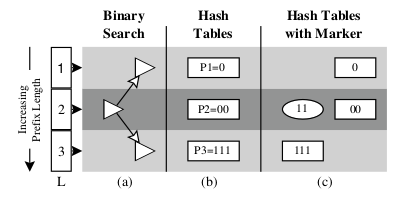Links
Abstract
Internet address lookup is a challenging problem because of increasing routing table sizes, increased traffic, higher speed links, and the migration to 128 bit IPv6 addresses. IP routing lookup requires computing the best matching prefix, for which standard solutions like hashing were believed to be inapplicable. The best existing solution we know of, BSD radix tries, scales badly as IP moves to 128 bit addresses. Our paper describes a new algorithm for best matching prefix using binary search on hash tables organized by prefix lengths. Our scheme scales very well as address and routing table sizes increase: independent of the table size, it requires a worst case time of log2(address bits) hash lookups. Thus only 5 hash lookups are needed for IPv4 and 7 for IPv6. We also introduce Mutating Binary Search and other optimizations that, for a typical IPv4 backbone router with over 33,000 entries, considerably reduce the average number of hashes to less than 2, of which one hash can be simplified to an indexed array access. We expect similar average case behavior for IPv6.
BibTeX (Download)
@inproceedings{Waldvogel1997Scalable,
title = {Scalable High Speed IP Routing Table Lookups},
author = {Marcel Waldvogel and George Varghese and Jon Turner and Bernhard Plattner},
url = {https://netfuture.ch/wp-content/uploads/1997/waldvogel97scalable.pdf},
year = {1997},
date = {1997-08-28},
urldate = {1000-01-01},
booktitle = {Proceedings of ACM SIGCOMM},
pages = {25-36},
abstract = {Internet address lookup is a challenging problem because of increasing routing table sizes, increased traffic, higher speed links, and the migration to 128 bit IPv6 addresses. IP routing lookup requires computing the best matching prefix, for which standard solutions like hashing were believed to be inapplicable. The best existing solution we know of, BSD radix tries, scales badly as IP moves to 128 bit addresses. Our paper describes a new algorithm for best matching prefix using binary search on hash tables organized by prefix lengths. Our scheme scales very well as address and routing table sizes increase: independent of the table size, it requires a worst case time of log_{2}(\textit{address bits}) hash lookups. Thus only 5 hash lookups are needed for IPv4 and 7 for IPv6. We also introduce Mutating Binary Search and other optimizations that, for a typical IPv4 backbone router with over 33,000 entries, considerably reduce the average number of hashes to less than 2, of which one hash can be simplified to an indexed array access. We expect similar average case behavior for IPv6.},
keywords = {Fast Routers, Hash Tables},
pubstate = {published},
tppubtype = {inproceedings}
}




